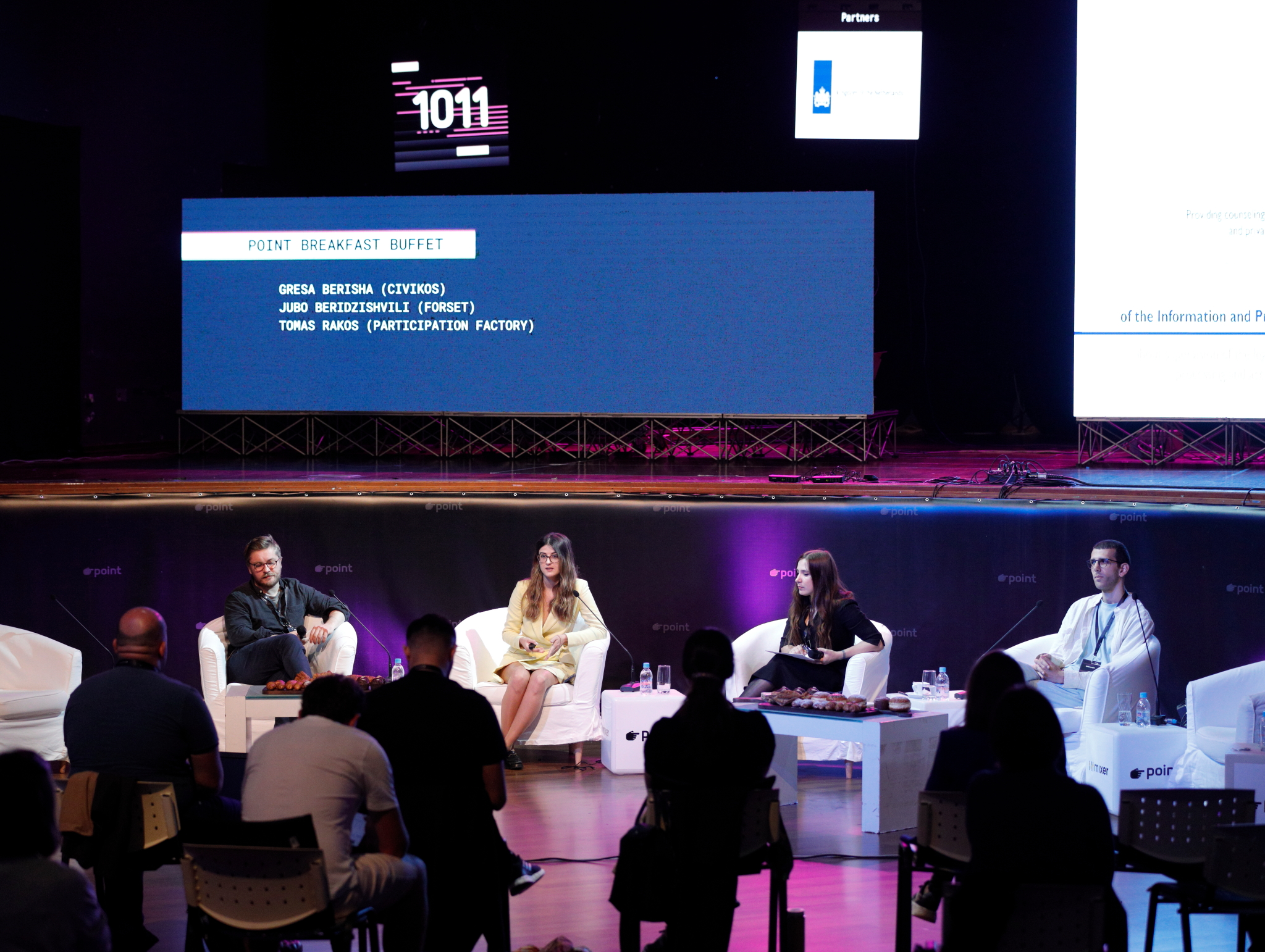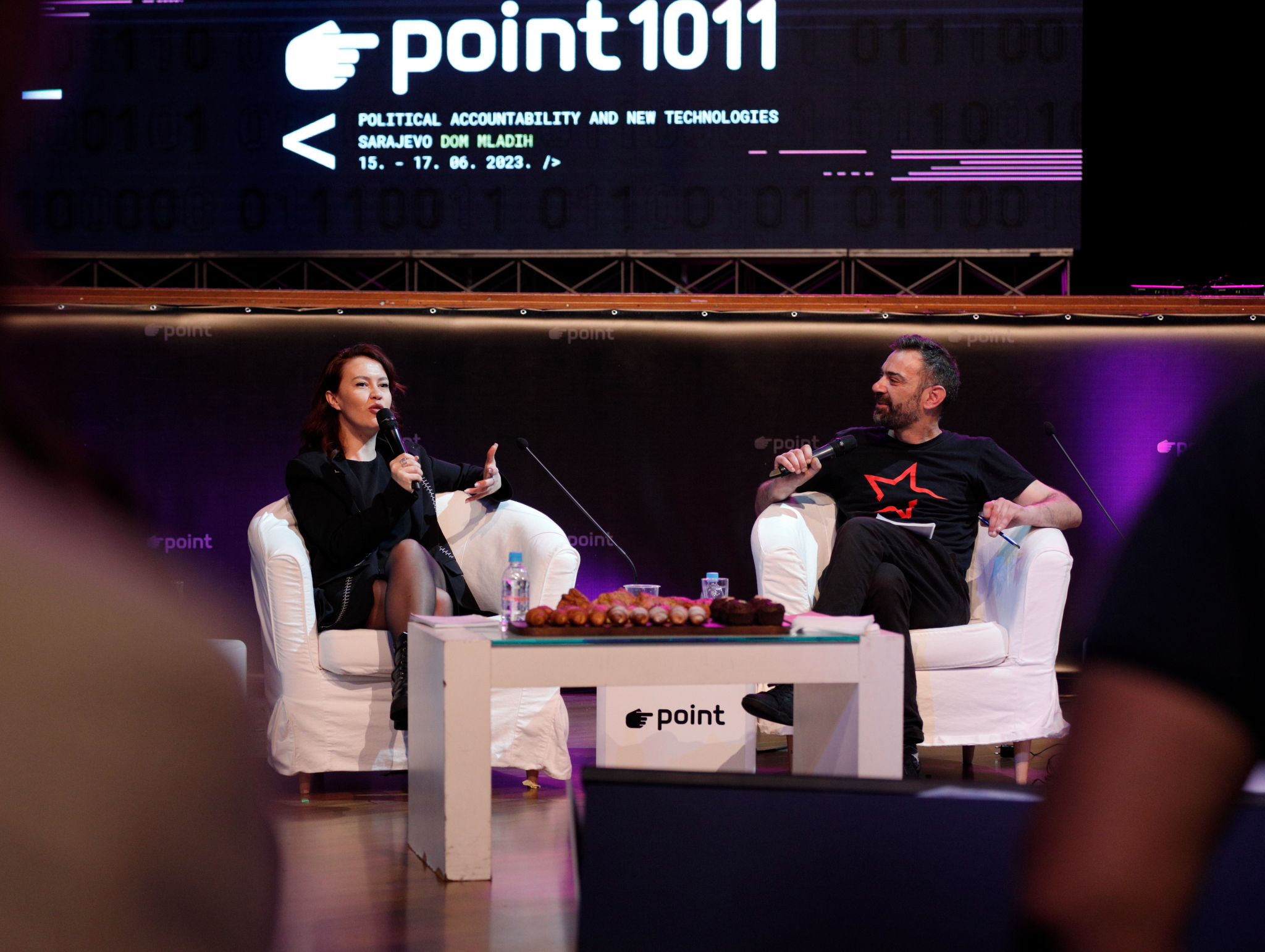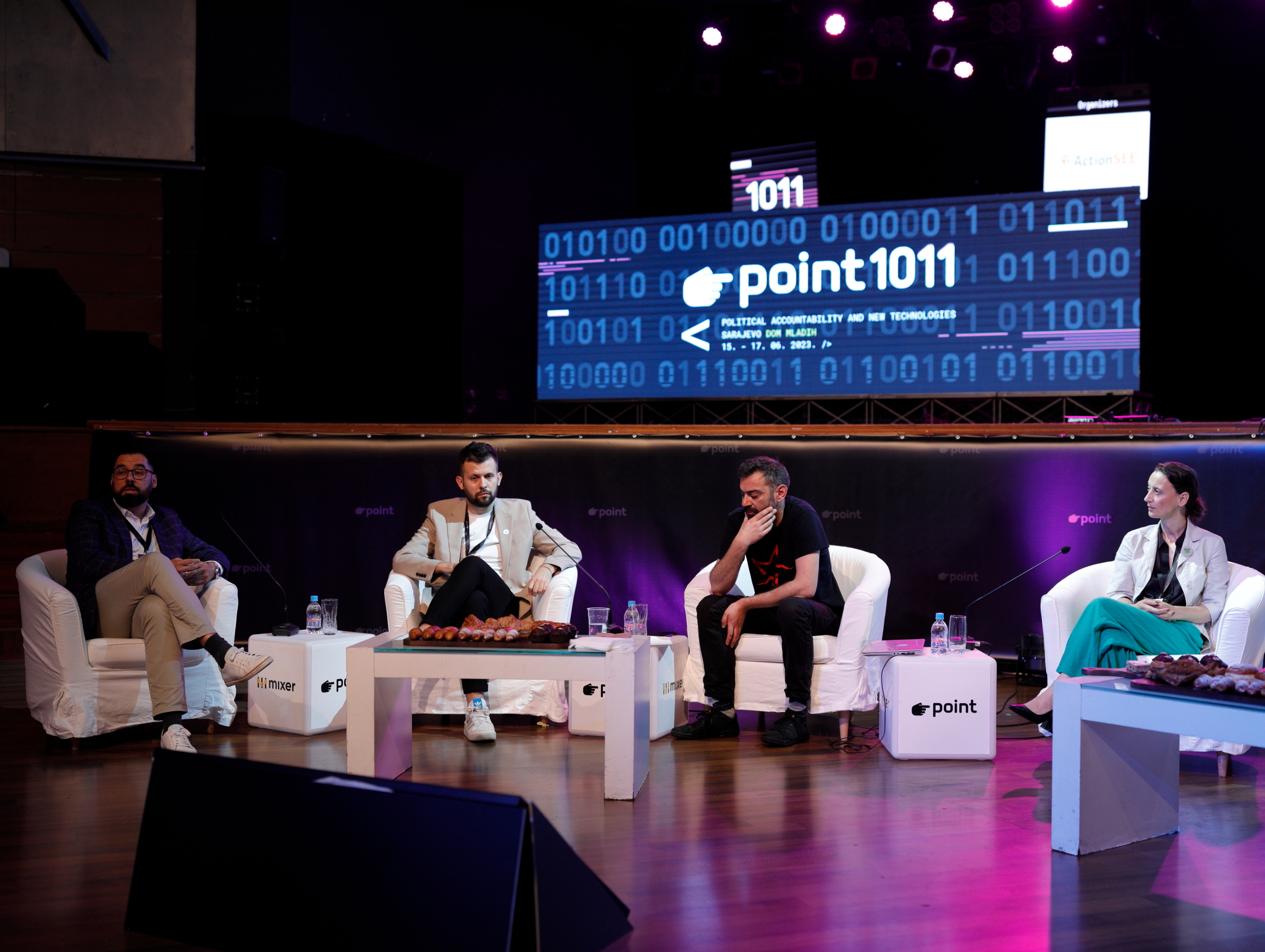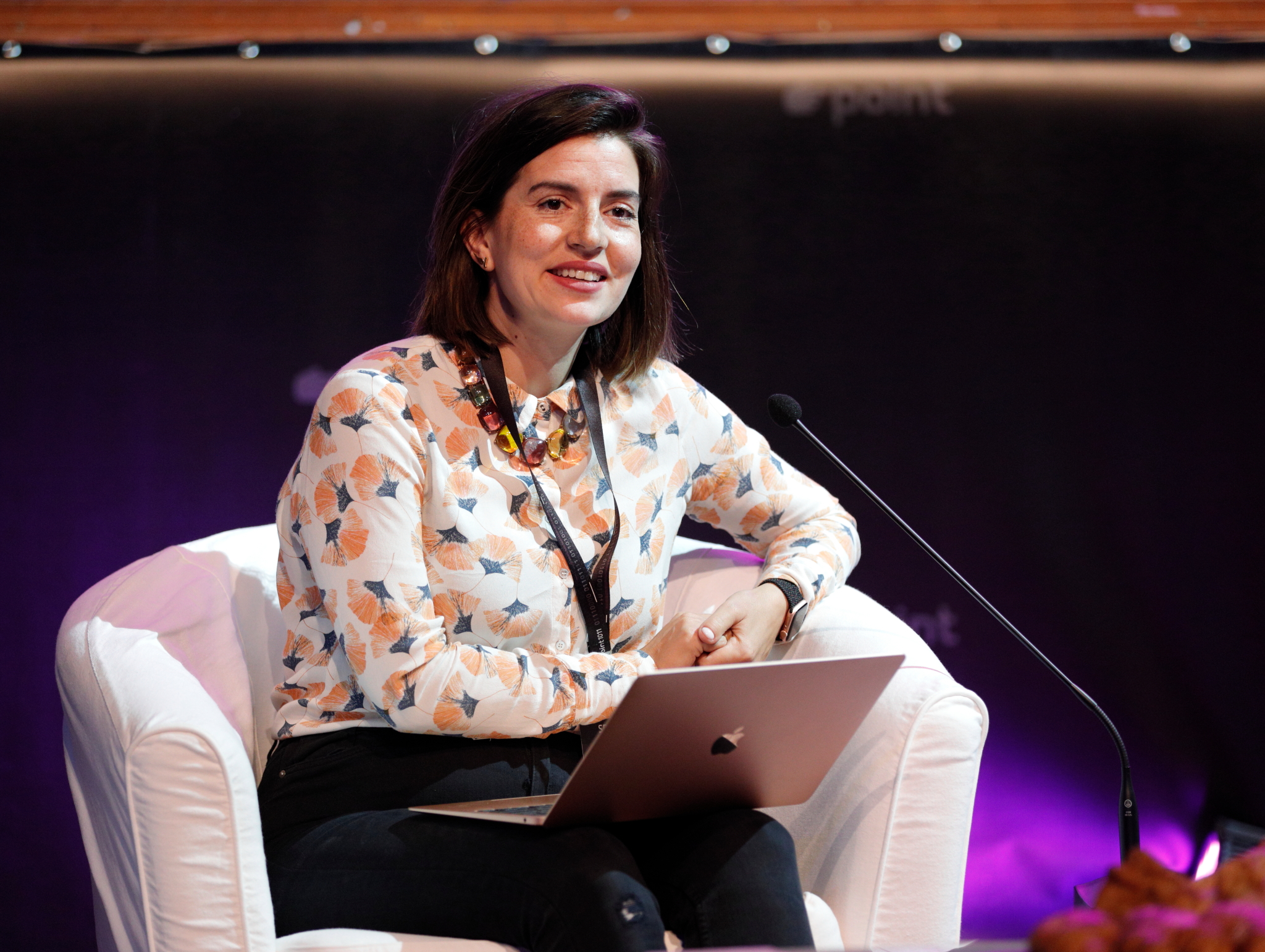POINT breakfast buffet: Political accountability, media ownership, science journalism and many more
The second day of the 11th edition of the POINT Conference kicked off with the POINT breakfast buffet, somehow a different form of the conference, whose interesting concept brought together speakers from Bosnia and Herzegovina, Serbia, North Macedonia, Kosovo, Albania, Slovenia, Georgia, Czech Republic and Belgium.

Hosted by Danira Karović and Dalio Sijah (CA “Why not”), this session focused on numerous initiatives and projects from the region and beyond showcased through several presentations, where participants had the opportunity to learn more about civic participation, political accountability, election processes, the fight against corruption, media ownership or science journalism.
The session started with Milica Antić, a non-profit digital transparency manager at Catalyst Balkans, a regional foundation based in Belgrade dedicated to developing and transforming philanthropy in the countries of the Western Balkan. She works alongside other non-profits, as they navigate the digital landscape and drive positive change. As someone who has a capacity-building background and working experience in civil society, she recalls how she started working for the Catalyst organization.
“We find out that, when you are working for non-profits, there are things you need to do first, and those are to teach organizations about the things you are working with. So, we created a learning hub for them, where they have online presentations about our work. We have a free Udemy course with interactive materials, where they can learn about marketing, fundraising and CRM (some sort of digital huge address book with information of other organizations and partners) in order to help them with mentorship and to save some time”, Antić says.
Talking about philanthropy and crowdfunding, Antić mentioned Giving Balkans, a platform where organizations can find a philanthropy niche – or, in her words, “the answer to the question who is funding what in the Western Balkans”.
The second panel brought presentations on civic tech. Gresa Berisha, project manager at the CIVIKOS platform from Kosovo, presented KerkoQasje, a platform for facilitating requests for public documents. The platform informs users of their rights and offers a way to file requests for public documents or file complaints when appropriate. Through the platform, filing a request takes just a couple of minutes and it has been shown to be very beneficial for journalists and organizations. Jubo Berdzenishvili, from Tbilisi-based CSO ForSet, presented DataforCrisis.com, a platform dedicated to leveraging data to make sense of the Russian migration in Georgia. Jubo explained that, since the war, Georgia was hit by a large Russian migration. The platform compiles publically available data gathered from social media, such as Facebook and Telegram. They monitor both, the Russian migrant community and Georgians, and then analyze the data in hopes of having a better understanding of topics that these communities talk about, how they feel about them etc. The platform offers visualized data for journalists. Tomas Rakos from the Czech Republic presented the work of his organization Participation Factory. Participation Factory focuses on helping institutions and organizations whenever they start a project that involves a “human factor”. Their activities include process design, civic/tech advisory, capacity-building programs and building of internal teams. Last year only they successfully finished around 50 projects in five countries.

Photo: Vanja Čerimagić
A feminist activist from Kosovo Adelina Tërshani shared a story on how her feminist slam poem tackled patriarchy in Kosovo at POINT breakfast buffet’s third panel. During the traditional protest on March 8th, 2017, Tërshani performed feminist slam poetry that tackles the lack of women’s participation in the labour market, sexual harassment, unequal pay for equal work, gender-based discrimination, and unpaid care work. She basically stated the obvious points on what happens to women and girls in a patriarchal society.
“It triggered a lot of men, a lot of little boys. It went viral and became a meme. They took a screenshot of my face when I looked angry and portrayed an angry, unshaved feminist”, said Tërshani.
Meme promoted the opposite of what she was standing for. It promoted the things Tërshani did not say, it promoted antifeminism.
“Fellow activist approached me and proposed action stated under the hashtag take back the meme. So we made graffiti with my face all over Prishtina. And, in this case, the face actually promoted feminism again”, stated Tërshani.
The fourth panel at the POINT breakfast buffet dealt with political accountability, corruption, and election tools and strategies.
Aleksa Vučen from Transparency International BiH, speaking on corruption in Bosnia and Herzegovina, joked that “we can stay here for weeks to talk about this issue”. He underlined that we have to speak about what’s the problem with corruption and using data, and how we can measure corruption.
“Corruption is a complex social issue, it spans from economic, political, social and cultural aspects, so it’s really hard to measure it. The important question, when it comes to measuring, is “what if”, because in this time of cynicism, that is prevalent in our online lives, it’s important to remind ourselves why we care. One of the possible answers is, if we do not, things will get even worse. And things are pretty bad right now because Bosnia and Herzegovina is the third most corrupt country in the world, just behind Russia and Ukraine. Corruption is influencing our healthcare, infrastructure, our social sphere, our lives. Ultimately, it deteriorates our human rights. So we have to ask ourselves – what if we can change those things? What if we can hope? Hope is the ultimate currency for the future”, Vučen says.
He also talked about data for measuring corruption.
“Data is objective and factual, and that’s something politicians don’t like. They like to interpret things and interpretation is a tool politicians use to manipulate and spin things around”, Vučan warns.

Photo: Vanja Čerimagić
Vekas Gušo, a Senior Program Assistant at the National Democratic Institute (BiH), talked about a mobile application that NDI developed for party poll watchers. It’s the result of joint efforts by NDI and local NGO “Pod lupom”, supported by NED. It consists of two parts: the first one is the so-called educational part and the second is the reporting part. The educational part includes provisions of the election law (the election laws are uploaded in the application, and divided into specific thematic). In the registration part, the most common election irregularities are collected, where specific thematic areas are also created with step-by-step explanations on how to behave when some electoral irregularities are noticed. It is available for all political parties, poll watchers and citizens. As Gušo said, the application is recognised by the Central Electoral Commission and recommended for use.
“This is a unique effort, and I hope the application will get wider recognition and, in upcoming elections, will be used on a much wider scale”, Gušo says optimistically.
Within this panel, the participants had a chance to see a presentation from Esmeralda Hoxha, a Project Manager of the Gender Alliance for Development Centre – POP Network and POP Network Coordinator (Albania), who is an experienced professional with a strong passion for environmental protection and human rights. She presented a POP Network platform that aims to increase public debate and information among citizens, as well as orient the platforms towards their needs and priorities. Through its activities, the project aims to strengthen Albanian democracy, promoting transparency and accountability. Talking about elections held in Albania in May this year, Hoxha said that people from this organization talk to citizens from urban and rural areas in order to listen to their problems.
“Doing this, we, together with citizens, make out individual social contracts with main priorities The idea is not just promises made by politicians – we have the opportunity to engage candidates and to sign social contracts, where a candidate who wins the election will have a social contract as a plan for four years, and will have to work on it”, Hoxha explained.
Nejc Horvat from the Slovenian NGO “Danes je nov dan” presented Twitter Brigade, a project that began in 2020, when they noticed Twitter accounts that work in unison to attack political opponents, NGOs and activists. They wanted to track and analyze them and see how they operate. Eventually, they found a propaganda network of about 500 profiles, including some fake ones. In the current iteration of Twitter Brigade, they are seeking to look at the macro version to determine the scale of these operations in Slovenia.
Nafisa Hasanova from Global Media Registry presented the Media Ownership Monitor (MOM), a project which has been implemented since 2015 in 21 countries around the globe.
“With a media ownership monitor, we try to provide transparency on media. That is a kind of meta journalism. We are trying to understand who is speaking to us”, stated Hasanova.
The MOM project is a database on what are the most important media outlets in a country; the faces of the owners that are behind these media; the media groups and conglomerates; the media assessment, that looks really deeply into how the media is regulated, and 10 indicators of risks to media pluralism.
“We target the general public, so we make the language accessible, the website accessible, and we provide this information in multiple languages”, Hasanova pointed out.
She noted that in the next six months, she will be trying to understand who owns the media in our region.
Scientific journalist, scientific communicator and author of the blogs Quantum of Science and Vakcine.ba, Jelena Kalinić, presented the projects which promote and popularize science and debunks science-related disinformation and fake news.
“We see a lot of disinformation coming from the far right around the world. So, my special interest in that context is the relation of science, politics, democracy and disinformation”, Kalinic said.

Photo: Vanja Čerimagić
Nevena Krivokapić-Martinović, a lawyer specializing in online media and freedom of expression in the digital environment and a member of the non-profit SHARE Foundation (Serbia), had the last panel at the POINT breakfast buffet session. She talked about a South East European network, a non-formal network for digital rights, that aims to build capacities and tackle the threat in the digital sphere that is happening in our region. The main goal, according to her, is to empower civil society organizations to keep up with digital rights.
Authors: Aldijana Zorlak, Alena Beširević, Nerma Šehović